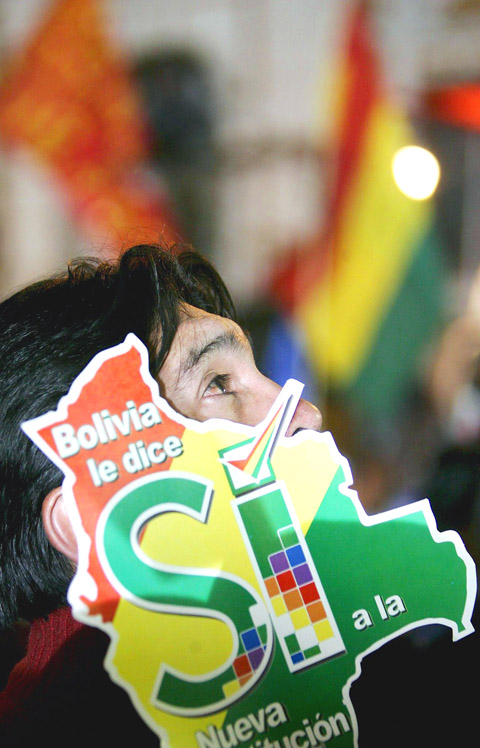Bolivian President Evo Morales yesterday was gearing up to redouble his nationalization push and other socialist reforms after winning huge support in a weekend referendum.
But his victory in Sunday’s vote, with 63 percent of voters backing his mandate, was tempered by strong gains also handed to political enemies — four opposition governors who are defying his program.
In a triumphant speech late on Sunday, Morales called on those governors to work with him.

PHOTO: EPA
But he also told a flag-waving crowd in La Paz: “Your vote consolidated the process of change.”
“We are here to continue recovering natural resources and the consolidation of nationalization,” he said.
Despite his solid win — improving on the 54 percent support that elected him Bolivia’s first indigenous president in December 2005 — Morales was facing a polarized country.
In the eastern lowlands, where the opposition governors rule, his authority was just as roundly rejected.
The divisions are ethnic, economic and historic.
The president relies on massive support among Bolivia’s indigenous majority, which accounts for six in 10 of the country’s inhabitants.
They live mostly in the Andes to the west and have become increasingly assertive under Morales in their demands for a greater share of the national wealth.
But the elite, mostly of European descent, sitting on much of that wealth in the eastern lowlands in the form of farmland and gas fields, are just as determined to resist.
The governors of the states of Santa Cruz, Tarija, Pando and Beni overnight celebrated their own landslide wins in the referendum.
Ruben Costas, of Santa Cruz, struck out in his speech against the president’s “dictatorship” and vowed Morales would not be able to step foot in his state.
Of the other four state governors whose jobs were also on the line in the plebiscite, three were seen to have been ousted in the referendum — two of them Morales critics, and one of them a Morales ally. One other Morales ally was reconfirmed to office.
Analysts said the referendum did not change the standoff between Morales and the opposition — although the president would probably now organize another referendum, this one to approve a new constitution that would enshrine many of his reforms.
Morales’ challenge now was in “melding together his roots as a president of South America’s ‘new left’ and at the same time a leader desperately in need of a formula for national unity,” said Jim Shulz, director of the Democracy Center in the city of Cochabamba.
Cochabamba Governor Manfred Reyes was one of the opposition leaders ousted in the referendum, with exit polls showing 57 percent of voters rejected his mandate.
However, he vowed to fight any attempt to make him stand down, raising the prospect of violence in his state, which has already been shaken by clashes early last year between his supporters and Morales loyalists.

PRECARIOUS RELATIONS: Commentators in Saudi Arabia accuse the UAE of growing too bold, backing forces at odds with Saudi interests in various conflicts A Saudi Arabian media campaign targeting the United Arab Emirates (UAE) has deepened the Gulf’s worst row in years, stoking fears of a damaging fall-out in the financial heart of the Middle East. Fiery accusations of rights abuses and betrayal have circulated for weeks in state-run and social media after a brief conflict in Yemen, where Saudi airstrikes quelled an offensive by UAE-backed separatists. The United Arab Emirates is “investing in chaos and supporting secessionists” from Libya to Yemen and the Horn of Africa, Saudi Arabia’s al-Ekhbariya TV charged in a report this week. Such invective has been unheard of

US President Donald Trump on Saturday warned Canada that if it concludes a trade deal with China, he would impose a 100 percent tariff on all goods coming over the border. Relations between the US and its northern neighbor have been rocky since Trump returned to the White House a year ago, with spats over trade and Canadian Prime Minister Mark Carney decrying a “rupture” in the US-led global order. During a visit to Beijing earlier this month, Carney hailed a “new strategic partnership” with China that resulted in a “preliminary, but landmark trade agreement” to reduce tariffs — but

Chinese President Xi Jinping’s (習近平) purge of his most senior general is driven by his effort to both secure “total control” of his military and root out corruption, US Ambassador to China David Perdue said told Bloomberg Television yesterday. The probe into Zhang Youxia (張又俠), Xi’s second-in-command, announced over the weekend, is a “major development,” Perdue said, citing the family connections the vice chair of China’s apex military commission has with Xi. Chinese authorities said Zhang was being investigated for suspected serious discipline and law violations, without disclosing further details. “I take him at his word that there’s a corruption effort under

China executed 11 people linked to Myanmar criminal gangs, including “key members” of telecom scam operations, state media reported yesterday, as Beijing toughens its response to the sprawling, transnational industry. Fraud compounds where scammers lure Internet users into fake romantic relationships and cryptocurrency investments have flourished across Southeast Asia, including in Myanmar. Initially largely targeting Chinese speakers, the criminal groups behind the compounds have expanded operations into multiple languages to steal from victims around the world. Those conducting the scams are sometimes willing con artists, and other times trafficked foreign nationals forced to work. In the past few years, Beijing has stepped up cooperation